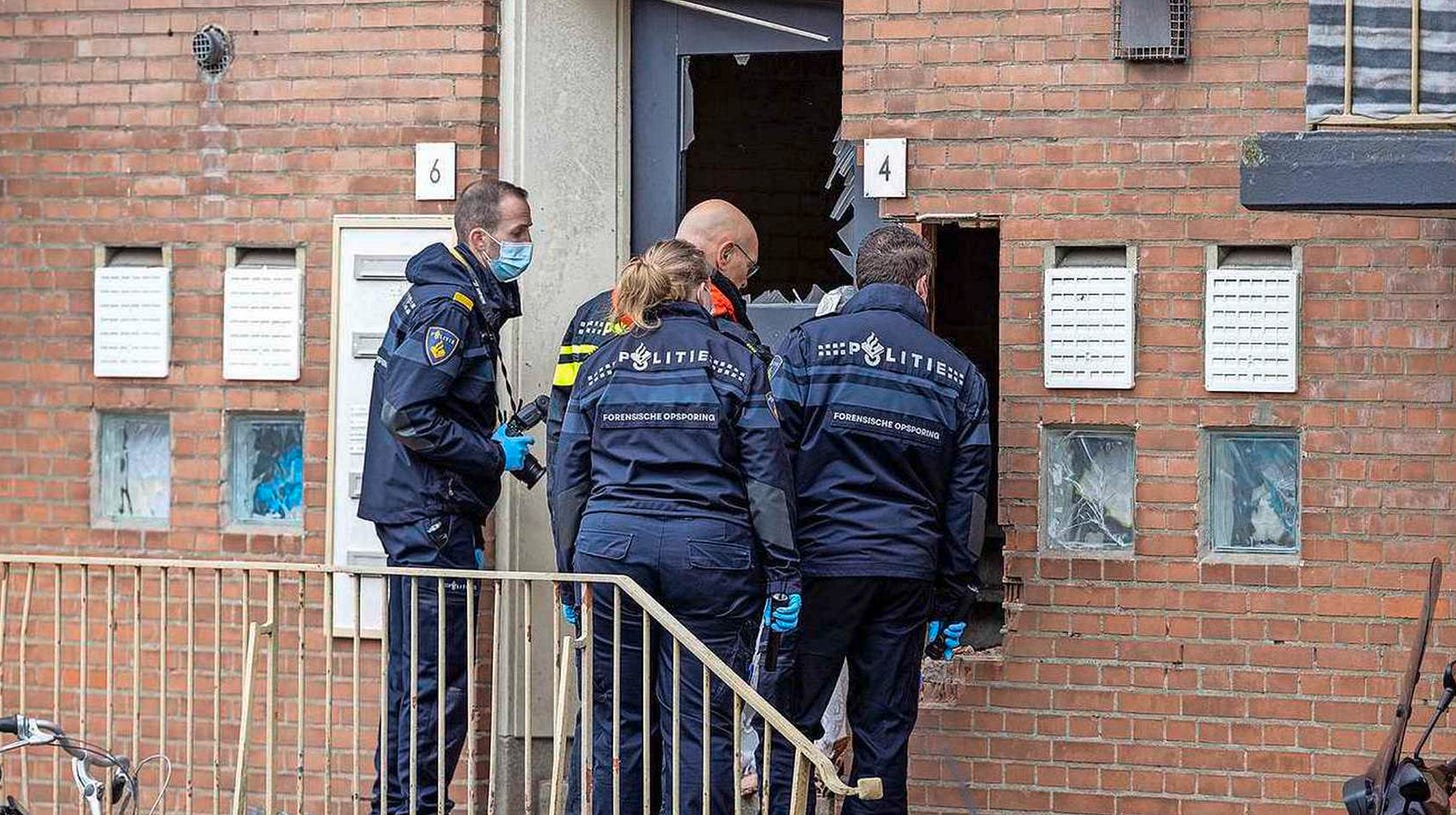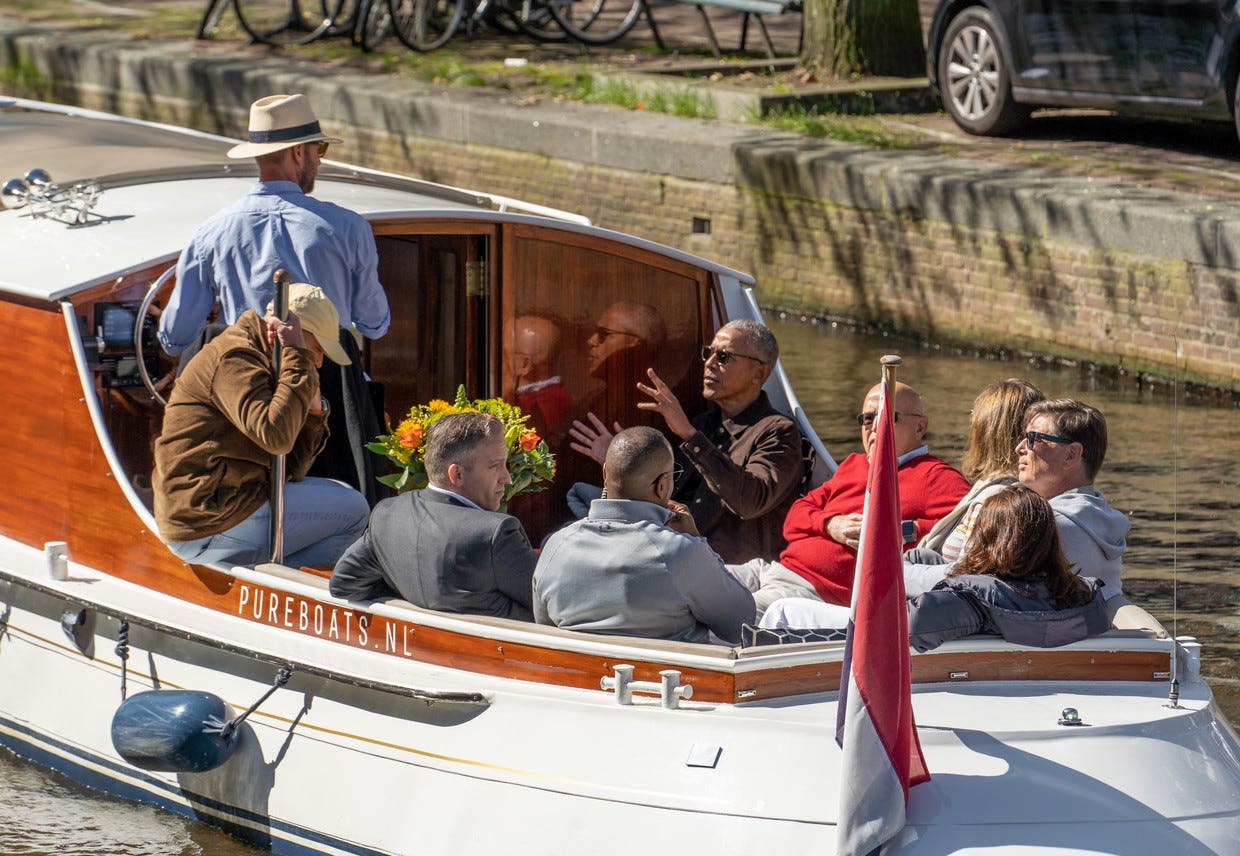The boy bombers attacking Dutch homes
Plus: A right-wing blunder during Zelensky's surprise NL visit
There have already been over 75 explosions in Rotterdam, Amsterdam, and Utrecht in 2023, an enormous increase from previous years.
The most immediate cause? Huge drug busts at Dutch ports.
In 2022, the police seized 52,480 kilos of cocaine in the ports of Rotterdam and Vlissingen—a street value of 3.5 billion euros.
This amount of confiscation has been possible thanks to cracked encrypted text messages sent between drug criminals—part of a massive international undercover operation I wrote about last week.
With sudden losses of product on their hands, thinking seized the drugs may have been stolen, drug criminals set off explosives at the front doors of homes or businesses to threaten competitors, demand payback for their losses, or draw the attention of the police to rivals.
These explosives can be hand grenades or homemade bombs made out of fireworks attached to gas cans. Or, bombers extract the explosive material from a Cobra—a heavy, illegal type of firework—combine it with detonator, and the result is a bomb as powerful as a hand grenade.
The media plays an important role here, according to defense attorney Gregg Stolk:
If [drug criminals] read somewhere that their shipment of cocaine has been intercepted by customs, they usually consider it a business risk... But if a load is missing and nothing about a drug bust has been in the news, all hell breaks loose. The people involved start to suspect each other of having stolen the drugs. Then they want to show the other that it is ‘serious shit’ and they will intimidate and threaten with shootings and explosions.
And sometimes batches of drugs are actually stolen. Recently 200 kilos of cocaine went missing in Rotterdam, starting a war “between two extremely violent criminal organizations.” Family members and neighbors are caught in the crosshairs.
Terrorizing neighborhoods
After one bombing, children at a slumber party in an adjacent apartment wound up with glass from a blown-out window in their hair. After another, the fire department reported that had a connecting door not been closed the explosion would have caused three deaths. A resident of the Bullepad in Amsterdam described the aftermath of an explosion this week:
It woke up the whole neighborhood. Through the window we saw a person tearing away on a scooter. I didn't dare go to the balcony: suppose he had a gun.
Last year, criminals started going after family members, business partners, or even neighbors of their rivals—a practice known chillingly as “target substitution.”
It is sheer chance that more people have not been seriously injured or killed. Someone walking out of a building at the moment an explosive is detonated seems inevitable.
Boy bombers
Teenage boys are often deployed to lay explosives. Boys as young as 14 have been arrested; a 17 year-old boy lost part of his leg when his bomb went off unexpectedly.
Drug criminals tell these boys that they will be paid as much as 1500 euros. They lure the boys with the promise of expensive sneakers, cars, clothes, and status. They are led to believe that if they are caught they will only go to prison for a year or two, and their record will be forgotten when they turn 18. Or the criminals apply even more manipulative pressure, implying that if they lay a bomb a “fictitious debt will be forgiven.”
But bombs can be deadly weapons; if someone is killed, the bombings could result in a life sentence. According to criminologist Henk Ferwerda:
Apparently these children are already part of criminal networks, otherwise they would not be asked for such an assignment. That is worrying for the future, because young people who carry out these types of assignments can quickly grow in the hierarchy and become professional criminals.
Geography, money, and partying
Proposals for stopping the bombings including things like: better community policing initiatives for boys; police and media collaboration to immediately report all seizures; and harsher sentences for everyone, including the boys at the bottom of the food chain.
Good ideas. But they don’t address two super-complex underlying problems.
First, the Netherlands and Belgium sit geographically at the center of the European drug trade. Cocaine arrives via some of the most massive ports in the world and is distributed widely from there.
In Rotterdam, the majority of young men who remove drugs from shipping containers are Rotterdammers; only a few come other parts of the country. They can earn 2000 euros per kilo of moved cocaine.
The financial lure of the international drug trade constantly showing up at the doorstep of young and easily influenced men is something the Netherlands will forever be reckoning with.
Second—the issue of demand.

Europeans are using more and more cocaine every year, and drug use has become normalized among young people in the Netherlands.
“For many people who go out, sniffing a line of coke is just as normal as ordering a beer… As soon as something is drunk, something is also sniffed.” Rick, 24
It’s ultimately not drug seizures that cause violence. It’s that the market is huge, and growing—and competition is fierce.
Zelensky’s surprise visit to the Netherlands

Ukrainian President Volodymyr Zelensky made an unexpected visit to the Hague this week, announced to the press only a few hours before his arrival.
The Netherlands is an important ally to Ukraine; we have donated 1.2 billion euros worth of weapons to the war effort, and “the two countries are in constant talks.”
Zelensky came to the Netherlands looking for additional weaponry, especially the forty-eight F-16 fighter planes that the Dutch military will soon phase out of its fleet, and a commitment that Ukraine can join NATO when the war is over.
He also wants the International Criminal Court, based in the Hague, to establish a tribunal to prosecute Russian war crimes.
Rejecting Ukraine on Remembrance Day

Zelensky’s visit coincidentally coincided with Dutch “Remembrance Day,” held annually on May 4 to commemorate Dutch civilians and military members who have died in wars or peacekeeping missions since the beginning of the WWII.
Caroline van der Plas, leader of the BBB (Farmer-Citizen Movement) party whose big win in recent elections I wrote I about a few weeks ago, attempted to use Zelensky’s visit to score nationalistic points.
She made the ill-considered, opportunistic move to boycott his speech in parliament, then Tweeted a Tweet so bad that it even made Russian state news—and sparked widespread outrage at home.

Her logic falls short for lots of reasons:
There have been Dutch casualties in the Ukraine war.
Zelensky is Jewish and his grandfather lost three brothers in the Holocaust.
On 17 July 2014, in a moment of major national trauma, 196 Dutch nationals died after Malaysia Airlines flight MH17 went down over eastern Ukraine. The flight was struck by a surface-to-air missile.
But it’s not van der Plas’ faulty logic that bothers me. It’s the “OUR victims,” and the ik, ik, ik, (I, I, I), when the whole context of Zelensky’s visit and his diplomatic and military alliance with the Dutch is “we.”
Let’s not forget: the Ukrainian border is only 1500 km away from the Netherlands.
As Defense Minister Kajsa Ollongren promised Zelensky at Soesterberg airbase during his visit:
We will continue to make substantial contributions to strengthening Ukraine's military power. Now and in the future. For as long as it takes.
Isolationist, nationalistic rhetoric is par for the course with politicians like van der Plas. Geert Wilders and Thierry Baudet—two aspiring populist leaders whose far-right parties flamed out over the last few years—also didn’t attend Zelensky’s visit.
But no one really cares what they do. They aren’t taken seriously anymore.
Van der Plas has power. The BBB has the most seats of any party in parliament, and her voter base in the Netherlands is huge. People listen when she talks.
Her rejection of Zelensky might wind up being her first major blunder, an indication that this champion of the farmers isn’t cut out for anything other than championing farmers.
People going to erase that Putinesque “OUR” from their heads too easily. And considering the standing ovation Zelensky received in the US Congress last December, it’s all the more embarrassing: this is how serious politicians receive a wartime president.
🥳 LEUKE DINGETJES
Last weekend an illegal rave in a little Belgian village drew 5,000 people, a crowd so large that for public safety police saw no choice but to let the ravers rave all weekend.
If this had happened in America, the police would probably have gone in with tanks and machine guns? Also in the name of public safety. Love it here.
Obama’s Guide to the Netherlands
Zelensky is not the only political superstar making the rounds in the Netherlands.
Last weekend Obama dined at Ron Gastrobar in Ouderkerk, de Kas in Amsterdam Oost, and Restaurant 1612 in Noordbeemster. He also hired a “1912 notary boat” for a canal tour and visited the Moco Museum in Amsterdam. Gezellig.
Boris Johnson arrested in Groningen
Last week a drunk driver in the north of the Netherlands handed a Ukrainian ID for Boris Johnson, expiring in the year 3000, to the police.
Hopefully Boris gets back to the UK in time for Charles’ coronation…
Currently #1 on Spotify Top 50 Netherlands
A new hit from Kevin & Yade Lauren.








I’m learning so much about my own country from these and also, I love that you say “we”!
interesting how the demand for cocaine looked like it was steadily (albeit slowly) on the decline and then spiked again in 2015 🤔